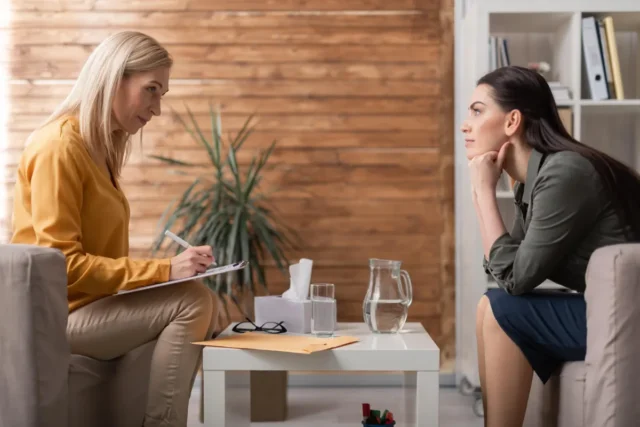
Dealing with anxiety can be a challenging, frustrating, and overwhelming experience. Often a manifestation of complex inner turmoil, anxiety isn’t always straightforward to navigate. However, that doesn’t mean it isn’t worth trying, or that it’s impossible to break its spell over you. Many others who have come before you have found ways to cope with and even remedy their anxious feelings. Read on to learn about four effective ways you can treat your anxiety.
1. Consider Targeted Medications

First off, medication is a powerful option to consider, even if you’re not interested in it as a long-term solution. When you’re hit by anxiety it’s easy for your mind to enter the “fight, flight, or freeze” mentality. Medication is effective at alleviating that anxiety so you can operate for longer stretches outside of that mindset. And by relieving some of that burden, you can spend more time focused on other things.
One of the most common and effective kinds of anti-anxiety medications is selective serotonin reuptake inhibitors. As their name suggests, SSRIs help balance the levels of serotonin in your brain. Serotonin is an important neurotransmitter responsible for regulating sleep, mood, and stress, among other things. So it’s essential to make sure you have the proper amount.
If you’re interested in trying them, you can get a prescription for an SSRI like Lexapro online, if deemed appropriate. You’ll be connected with a licensed medical provider that can guide you through a personalized treatment plan. Taking medication can help make a difference when it comes to dealing with anxiety. And its mood-stabilizing effects can provide a solid foundation that you can build upon with other therapeutic techniques.
2. Develop Your Self-Soothing Skills

Taking medication can be incredibly helpful for managing anxiety; even life-changing in some cases. However, it’s important not to rely solely on external resources. You also want to develop your own capacity to help yourself. And one such way of doing so is learning how to self-soothe.
Self-soothing is the act of using habits, activities, and techniques to calm yourself down. That might be a relaxing activity like reading a book. Or it might be engaging in a healthy habit like cleaning your room. You might find relief from a meditative breathing practice. What soothes one person might bother another, so experiment and find what works for you.
Once you find a few habits you know can soothe you, make a list and keep track of them. While they might be easy to remember now, you may forget when you’re struck with anxiety. Keep your list in a place that’s easily accessible at a moment’s notice. You could store it on your desk or in your backpack, phone, or another safe place. Look at it when you’re feeling stressed and pick a self-soothing practice that suits the moment best.
3. Talk to Someone

Struggling with anxiety is rarely easy, but you’re not doing yourself any favors by keeping it bottled up. Sometimes your problems can seem bigger and more intimidating than they really are when you keep them inside. Your imagination can help them fester with fear. So it’s important to let your anxieties out into the light where you can see them for what they really are. And talking with someone can help you do just that.
When you talk to someone who’s a good listener they’ll act as a mirror for you. Physically, a mirror shows you something about yourself that you can’t see on your own. And talking to a good listener sheds light on ways of thinking or tendencies you might be blind to. This kind of feedback is invaluable and can totally change the way you approach your anxiety.
As helpful as talking to someone can be, you definitely want to find the right person. Confiding in just anyone can lead to invalidation or greater confusion than you’re already experiencing. So find someone you can trust. This could be a friend, family member, or licensed professional. With any luck, they’ll help you see your struggles in a new light.
4. Practice Exposure Therapy

Talk therapy isn’t the only kind that works. Sometimes it takes facing your fears to dispel their power over you. And that’s exactly the goal of exposure therapy.
As you might imagine, exposure therapy involves slowly encountering the source of your fears and anxieties. In doing so, you give yourself the opportunity to see that they aren’t as fearsome as you might imagine. And that you’re stronger and more resilient than you might think. However, it’s also important to take a slow approach and not dive into the deep end too quickly.
For example, if you feel anxious in large crowds then maybe avoid heading straight to Times Square. Rather, start small by attending a gathering of close friends or getting dinner at your favorite restaurant. Invite someone you trust to come with you so you have someone to support you. Then, slowly start joining larger and larger crowds until you feel more comfortable. And, eventually, you might find that your social anxiety feels like a distant memory.
Be Kind to Yourself
Dealing with anxiety is hard. There’s no question about it. But you can face your anxiety and slowly release its power over you one step at a time.
That might mean investing your energy into developing your self-soothing practice. Or it might mean taking medication and meeting with a therapist. Whatever it takes and however long it takes, just remember to be kind to yourself along the way.








